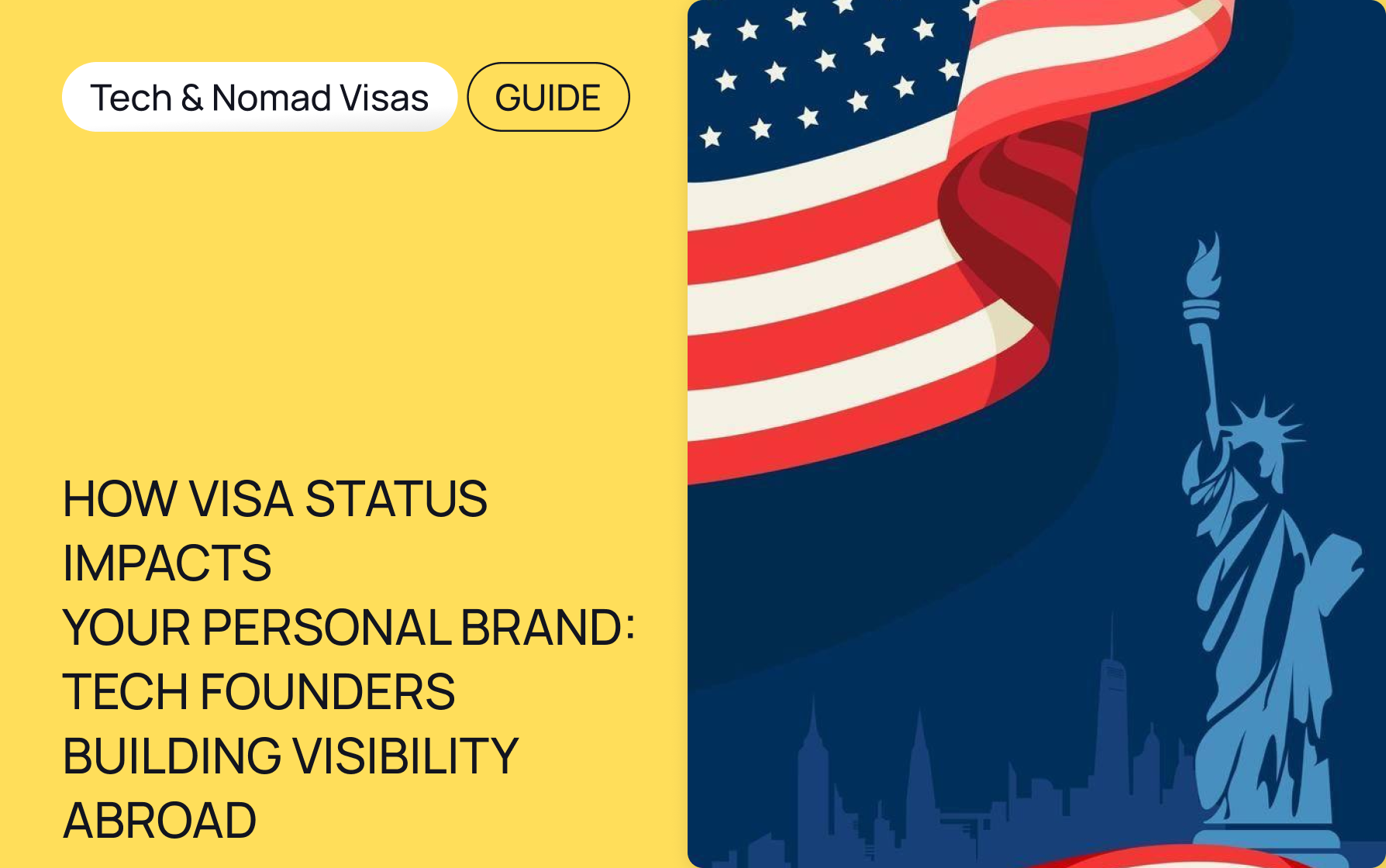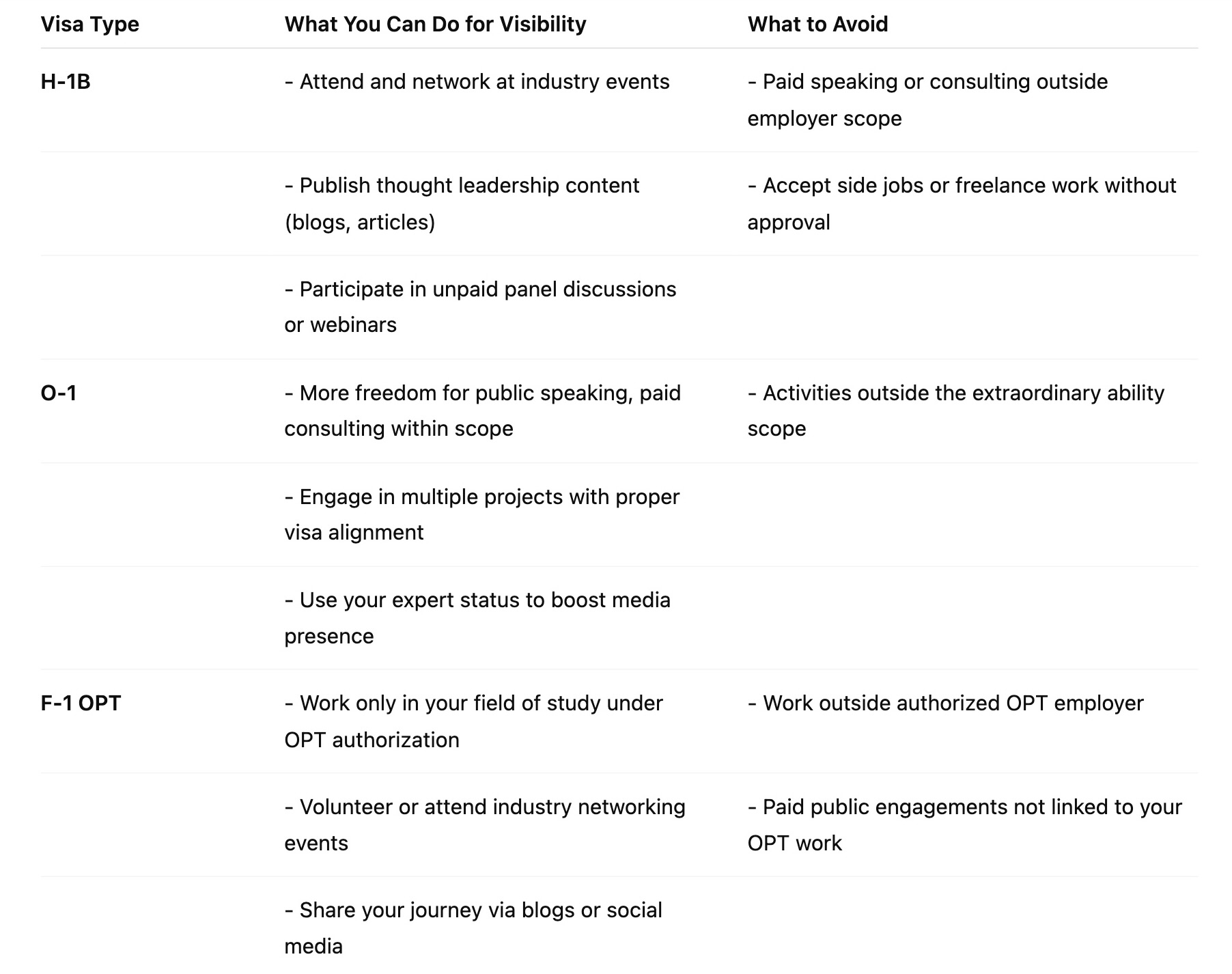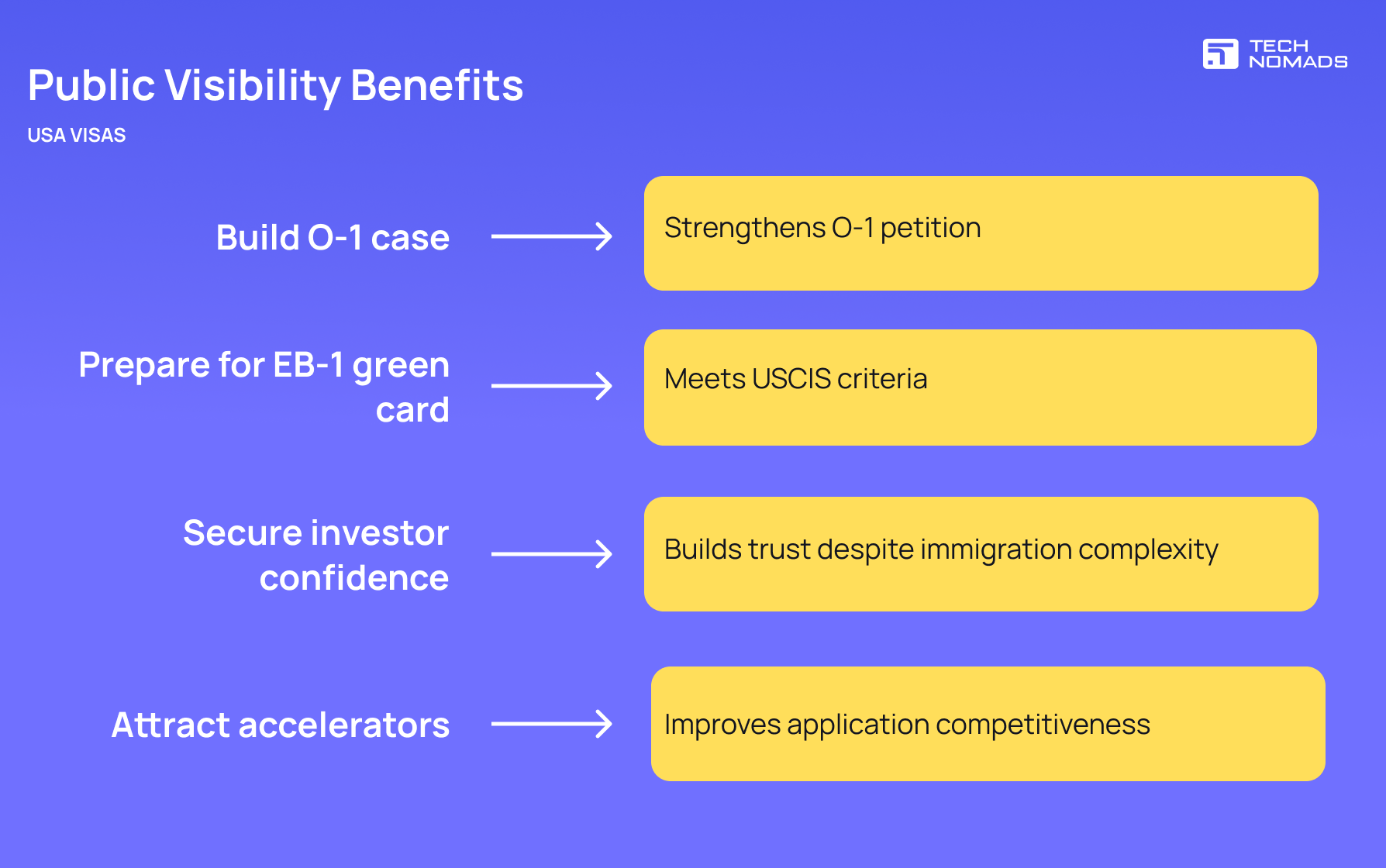
In the startup world, perception is currency. Every pitch you make, every headline you’re featured in, every LinkedIn post you publish—it all builds the narrative around you as a founder. But what many don’t see, and what even fewer talk about, is how your immigration status subtly yet powerfully shapes that narrative. For international founders building their companies in the United States, your visa isn’t just a legal framework—it becomes an unspoken part of your brand.
Whether you’re navigating the limitations of an H-1B, positioning yourself for an O-1 as a “person of extraordinary ability,” or in the long and uncertain queue for a green card, your visa status can impact everything from how investors view your stability, to whether the press highlights your global journey, or skips it altogether. It can influence your confidence on stage, your eligibility for certain opportunities, and even how much personal information you’re willing to share publicly.
This guide unpacks the unspoken realities of building a public-facing founder brand while navigating the complexities of the U.S. immigration system. It’s not just about compliance—it’s about visibility, strategy, and self-advocacy. Because in today’s global tech ecosystem, your story matters—and how you tell it can be just as important as the product you’re building.
Building a strong public profile is key for any founder who wants to succeed in the competitive U.S. tech scene. But for global entrepreneurs working in the U.S. on a visa, this task comes with unique challenges. Your visa status doesn’t just determine your legal right to work — it also affects how you can engage with investors, media, and your professional network. Knowing how to navigate these rules is essential to building visibility while staying compliant.
Understand Your Visa Restrictions
Leverage Your Story Strategically
Highlight skills, achievements, and innovation without focusing on visa challenges.
Choose Compliant Visibility Activities
Build Supportive Networks
Maintain Legal Compliance
Plan Your Public Profile for the Long Term

Beyond legal limitations, visa status impacts how confident founders feel sharing their stories. Founders who are uncertain about their future in the U.S. may be unable to make long-term branding investments. Others may avoid drawing attention to their immigrant background, fearing it may be seen as a liability rather than an asset.
However, global perspective is increasingly being recognised as a game-changer in tech. Investors and the media are slowly starting to embrace diverse founder journeys—especially those that involve resilience and international experience.
It’s a common myth that if you’re not receiving money, the activity is allowed. That’s not always the case. Some visas (like the H-1B) tie you strictly to your employer, and even unpaid work (like helping out with a friend’s startup or speaking engagements outside your field) can be considered unauthorised employment. Always consult an immigration lawyer before taking on side activities—even unpaid ones.
Founders often list themselves as "CEO" or "Founder" of a U.S.-based company on LinkedIn without having the visa to legally work for that entity. This can raise red flags with immigration authorities. Always ensure your public titles and job descriptions reflect your actual, authorised role under your visa.
Speaking at an event or appearing in a sponsored post may seem like minor publicity, but if you’re compensated—or even if it could be construed as promotional or commercial—it could violate your visa terms. Be especially cautious with brand collaborations or monetised content.
Many founders put a great deal of effort into building a public profile but fail to document it properly or highlight the right types of achievements when it comes time to apply for an O-1 or green card. Your visibility should be intentional and strategically tied to your long-term immigration goals, with proper documentation and evidence.
It’s tempting to move forward on an idea and start operating as a founder, but if your current visa doesn’t permit you to work for your own company, doing so—even behind the scenes—can seriously jeopardise your immigration future. Structuring the company correctly, and possibly working through a legal agent or authorised sponsor, is critical.
Immigration policies change often, and what was acceptable a year ago might no longer be. Visa holders who are heads-down building their businesses often miss key updates that impact their rights and responsibilities. Regularly check official sources or work with a global mobility partner to stay updated.
When applying for visas like the O-1 or EB-1, documentation is everything. Founders who don’t keep records of their media mentions, awards, public speaking, or startup traction may find themselves scrambling to assemble evidence too late. Treat every achievement as part of your long-term immigration case file.
Personal Branding Tactics for Non-U.S. Founders
Building a strong personal brand as a non-U.S. founder in the American tech ecosystem requires both strategic storytelling and careful navigation of visa-related boundaries. Here are proven tactics to help you create an authentic, compelling profile that resonates with investors, partners, and your community:
1. Craft a Clear, Unique Founder Narrative
Your international background is a powerful asset. Frame your journey to highlight how your diverse experiences fuel innovation and leadership. Share your vision with confidence, focusing on the value you bring — not the visa hurdles.
2. Showcase Expertise Through Content
Create thought leadership by writing articles, blogs, or LinkedIn posts on topics in your field. Sharing knowledge positions you as an expert without requiring paid engagements that might conflict with visa restrictions.
3. Leverage Virtual Platforms
Participate in webinars, online panels, and virtual conferences as a speaker or panelist—often as an unpaid contributor. These formats allow you to gain visibility globally while minimizing visa compliance risks.
4. Engage with Immigrant and Founder Communities
Join local and international networks designed to support immigrant entrepreneurs. These communities provide mentorship, connections, and sometimes investor introductions tailored to your unique situation.
5. Align Your Brand With Your Visa Status
Be mindful of your visa type when planning public appearances or side projects. Always seek legal advice before engaging in paid roles outside your visa sponsorship to avoid jeopardizing your status.
6. Build Relationships with Media and Influencers
Reach out to journalists and industry influencers who cover immigrant entrepreneurs or tech innovation. Personal stories about resilience and diverse perspectives often attract positive media attention.
7. Maintain Consistency Across Channels
Keep your messaging consistent on LinkedIn, Twitter, personal websites, and any public profiles. A cohesive brand helps build recognition and trust over time.
8. Prepare for the Long Journey
Personal branding is a marathon, not a sprint. Regularly update your story as your visa status evolves or as you reach new milestones. Authenticity and perseverance will make your brand stand out.
Consider how different public activities can align with your long-term immigration strategy. For example, if you’re preparing for an O-1 visa, you’ll need evidence of “extraordinary ability.” Strategic media placements, speaking gigs, and published work can support this application.

Growing your influence as a visa-holding tech founder in the U.S. requires smart strategies combined with a solid understanding of your visa’s limits. Here’s how to build your profile effectively, stay compliant, and open doors to new opportunities:
1. Understand Your Visa Boundaries
Know exactly what your visa allows and restricts—especially around work, paid engagements, and public speaking. This knowledge keeps you safe and confident as you grow your presence.
2. Build Your Personal Brand Through Content
Share your expertise and founder story on platforms like:
3. Network in the Right Communities
Expand your connections by joining:
4. Engage in Compliant Speaking and Panel Opportunities
Participate as an unpaid speaker or panelist in virtual conferences, webinars, and community events to boost visibility without visa conflicts.
5. Maintain Consistent Social Media Presence
Keep your profiles updated and authentic on LinkedIn and Twitter, regularly sharing milestones, lessons, and your unique perspective.
6. Always Consult Legal Experts
Before taking on any paid work, speaking fees, or side projects, get professional immigration advice to avoid risking your status.
And remember:
Your public profile isn’t just a branding tool—it’s part of your immigration strategy. For international tech founders, every podcast, article, and panel is an opportunity to build credibility not only with investors and customers, but with immigration authorities too. The key is knowing how to navigate that visibility with intention.
Rather than letting your visa define your limits, let it inform your roadmap. With the right support, you can turn what many see as a challenge into one of your greatest strategic advantages.
1. Can I promote myself and my startup on social media while on a visa?
Yes, as long as the promotion is unpaid and doesn’t involve unauthorized work. Sharing your achievements, writing posts, or discussing your startup’s progress is generally permitted and encouraged to build your brand.
2. Will talking about my visa challenges hurt my public image?
Not necessarily. If framed with resilience and strategy, sharing your immigration journey can enhance your authenticity and build trust. Investors often appreciate transparency when paired with a strong vision and leadership.
3. Can I accept speaking engagements as a founder on a visa?
It depends on the visa type. Unpaid speaking at academic, industry, or community events is often allowed. However, always check with an immigration lawyer before accepting paid or commercial speaking gigs.
4. Do I need to hide my visa status from the media or investors?
No, but you should be strategic. Rather than making your visa the focus, highlight how your international background fuels your innovation and drive. Use it as part of a bigger story—not the whole story.
5. Can I build a personal brand without risking my visa status?
Absolutely. Through unpaid thought leadership, networking, and media engagement, you can grow a strong public presence while staying fully compliant. The key is knowing your visa limits and choosing visibility tactics that align.
Navigating the U.S. tech ecosystem as an international founder comes with both opportunity and complexity. From day one, you are not only building a company—you’re also managing a careful balance between immigration compliance, public positioning, and professional growth. This guide has walked through the key elements of that balance, from understanding what type of visibility is safe under various visa categories, to crafting a consistent public presence that aligns with both your entrepreneurial goals and your immigration trajectory.
As we conclude, it’s important to look beyond the tactical checklists and see the broader value of visibility: when approached strategically, visibility is not a short-term marketing tool—it’s an investment in your long-term legitimacy as a founder, both in the eyes of the startup ecosystem and the U.S. immigration system.
Throughout this guide, we’ve emphasised the importance of staying within the legal limits of your visa—a non-negotiable foundation. But we’ve also reframed the idea that visibility is inherently risky for international founders. The truth is, many of the most valuable forms of visibility—publishing thought pieces, engaging in unpaid speaking, being cited in the media, participating in virtual founder communities—are legally permissible and strategically beneficial.
When curated properly, your public presence becomes a form of evidence: for investors deciding whether to back your team; for accelerators determining your fit; and even for immigration officers evaluating future visa or green card petitions. Visibility supports credibility. Credibility supports mobility.
As a global founder, your lived experience, cross-cultural insight, and resilience are not liabilities—they are differentiators. In a saturated tech space, authenticity and originality matter. Your background can be a powerful narrative asset if communicated in a structured, intentional way.
The most compelling personal brands are built on clarity and consistency. Across platforms—LinkedIn, Twitter, personal websites—ensure that your voice reflects your expertise, your startup vision, and your role within it. If your current visa does not allow you to work directly for your startup, make sure your language reflects that reality. You can still highlight your influence as a technical contributor, advisor, or thought leader, without crossing legal boundaries.
One of the consistent threads running through this guide is the importance of evidence. Strategic visibility isn’t just about how others perceive you today—it’s about how your trajectory can be documented and validated tomorrow.
Keep a centralised record of your achievements:
This evidence doesn’t just help with future visa or green card applications—it also streamlines your ability to apply for grants, equity-free funding, fellowships, and international press opportunities.
Visa pathways evolve, as do immigration trends and adjudication standards. What remains constant is that founders who prepare early, stay informed, and build visibility steadily are far more likely to succeed—both in business and in long-term residency planning.
Wherever you are in your journey—pre-seed stage, Series A, or early MVP—you should treat visibility not as a side task, but as a pillar of growth. The earlier you begin, the more naturally your public credibility grows with your startup.
Be mindful of ecosystem norms. In Silicon Valley, for instance, social proof often matters more than resumes. In New York, connections to institutional players carry weight. In smaller or emerging hubs, a few high-impact visibility moves—like a keynote speech or media piece—can have outsized effects. Knowing your ecosystem helps you prioritise where to show up and how.
You’re not meant to do this alone. One of the best assets for international founders is a supportive network. Whether that’s through global mobility firms, legal partners, immigrant-founder Slack channels, or accelerator alumni groups—investing in relationships with those who understand your path can save time, avoid missteps, and even open doors to visibility opportunities.
Visibility is not about shouting louder—it’s about being seen in the right rooms, by the right people, at the right time. A good network helps you do just that.
The road to building a high-growth company while navigating U.S. immigration is rarely linear. But it doesn’t need to be a source of constant stress. With legal awareness, strategic storytelling, and a commitment to playing the long game, you can build a presence that does more than promote your company—it protects your future.
So, what does strategic visibility look like in practice? It’s the founder who:
This is not about performing success. It’s about defining success on your own terms, and then backing it up with substance, structure, and strategy.
As an international founder in the U.S., your voice matters. Your journey—complex, courageous, and globally informed—is already unique. With clarity, legal understanding, and purposeful visibility, you can turn that uniqueness into momentum.
Build in public, stay compliant, and take up space. The startup world doesn’t just need more companies—it needs more founders like you, shaping it from the front.
Do you find it hard to showcase and structure your achievements for the USA Visa application? Or are you uncertain about which experiences USCIs finds most relevant? Tech Nomads has you covered.
Tech Nomads is a global mobility platform that provides services for international relocation. Established in 2018, Tech Nomads has a track record of successfully relocating talents and teams. Our expertise in adapting to regulatory changes ensures our clients’ satisfaction and success.
To explore your USA relocation options, you may:
Subscribe to our social media platforms to stay up-to-date on global mobility news and opportunities: